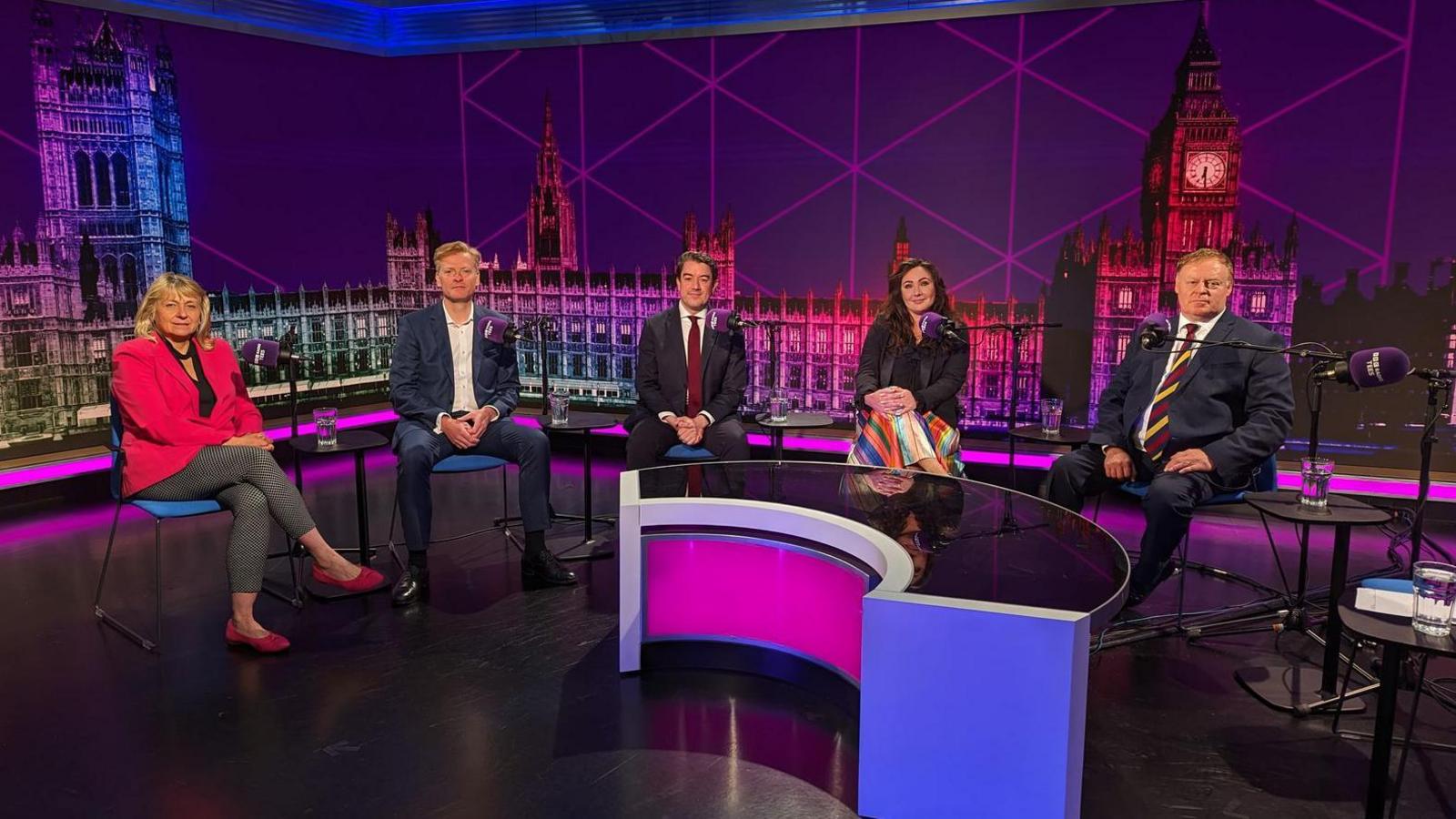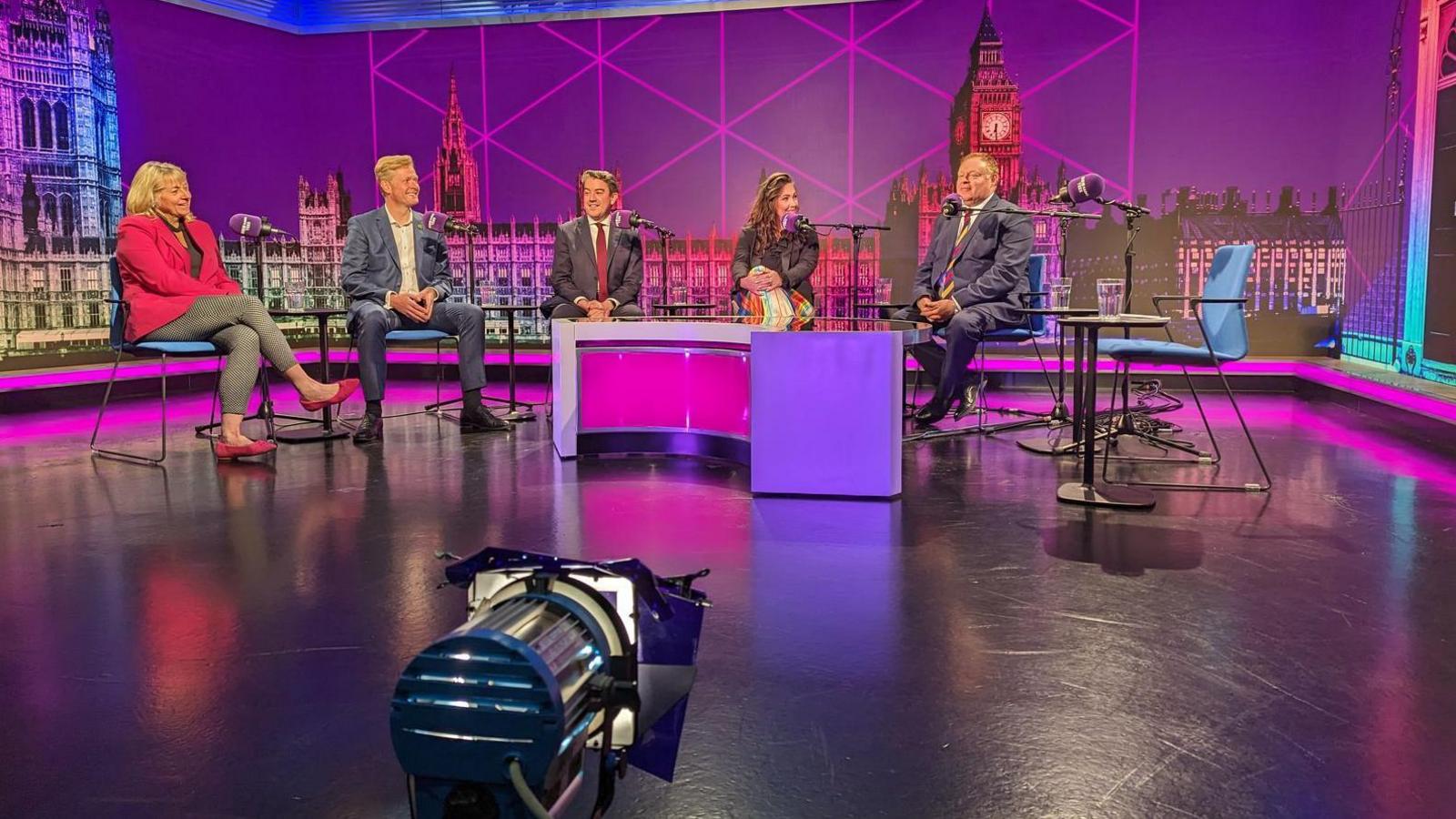Seven takeaways from the BBC Tees election debate

The candidates are standing for election across the BBC Tees region
- Published
Dentistry, pensions and levelling up were all key issues discussed when five candidates from across the BBC Tees region took part in the Your Voice, Your Vote General Election debate.
Chaired by the BBC’s North East and Cumbria political editor Richard Moss and based around listeners' questions, Conservative Jane MacBean and Labour’s Alan Strickland clashed over the Tories record in office and Labour’s plans for the future.
Reform’s Steve Matthews said immigration was the “elephant in the room" while Liberal Democrat Jemma Joy said she was sick of immigrants being used as a “political football".
And the Green Party’s Matthew Snedker said we lived in the sixth richest country in the world but people were wondering where all the money had gone?
The tone of the debate was something of a rarity – being both passionate and well-mannered – but what did we actually learn after 57 minutes of discussion? Here are seven takeaways.
1. Energy is everything
Even though there was no specific question on it, one subject that kept coming up was energy.
When the discussion focused on levelling up, Green candidate Matthew Snedker said renewable energy was hugely important to create high quality jobs across the region, although Hartlepool’s nuclear power plant might not have a bright future under the Greens.
Liberal Democrat Jemma Joy talked about energy during a discussion about housing, saying older homes should be “retrofitted” to insulate them better, bringing down bills and helping with climate change.
Perhaps most surprisingly, energy also came up during a discussion about pensions – Alan Strickland said “switching on” Labour’s plans for a publicly-owned energy company would drive down bills for pensioners, while Reform’s Steve Matthews said we need to be “drilling under our feet” to extract the “treasure” of gas, which could help pay for better pensions.
2. Are pensioners being hit hard...by the cost of childcare?
Another, perhaps unusual, take on the pensions discussion was the difficulty many people are having securing affordable childcare.
Labour’s Alan Strickland said their plans to cut the cost of childcare would help older people, since many grandparents were having to use their pensions to pay for it.
Conservative Jane MacBean said her party had already helped on that issue, by providing more free hours of childcare. She also said that, unlike Labour, they had committed to the pensions triple lock over the long term.
Mr Strickland said his party had long been committed to it too.
3. It is not necessarily about bobbies on the beat
The conventional wisdom is that to cut crime we need more “bobbies on the beat”.
But Liberal Democrat Jemma Joy found herself surprised to be in agreement with Reform’s Steve Matthews in doubting how true that was.
Mr Matthews, a former police officer, said the other parties had no understanding of the reality of beat policing.
Jemma Joy said crime had changed so policing needed to be more about intelligence and move on from the days of Dixon of Dock Green or Gene Hunt “firing up the Quattro.”
But Conservative Jane MacBean took a more orthodox approach, talking about recruiting more officers, as did Labour’s Alan Stickland, promising 13,000 new neighbourhood officers.
Green Matthew Snedker stressed the importance of reforming prisons, to rehabilitate criminals and stop them reoffending.

The BBC is hosting a series of debates in to the run-up to the election on 4 July
4. Everyone is getting their teeth into the election
NHS dentists – or the lack of them – is undoubtedly one of the biggest issues at this election.
The Green Party’s Matthew Snedker said they would invest £3bn to recruit and retain more dentists.
Liberal Democrat Jemma Joy said there needed to be long-term incentives to keep dentists working for the NHS.
Labour’s Alan Strickland said dentistry was a day one priority for a Labour government, creating 700,000 more urgent NHS appointments.
The Conservatives took a lot of flak over the state of NHS dentistry in the debate but Jane MacBean said her government had addressed the problem.
She also came close to breaking into The O’Jays' For the Love of Money while returning fire on the other candidates.
“All I’m hearing is money, money, money, money…we’re going to throw money at absolutely everything!” she said.
5. The Conservatives still believe they can sell levelling up
Jane MacBean gave a stout defence of her party’s key promise from 2019 - levelling up.
She said the Conservatives had invested millions of pounds into the region, although perhaps misplaced the BBC Tees audience a little by talking about cash pledged further up the road in Gateshead.
Not surprisingly, the other candidates disagreed.
Labour’s Alan Strickland said levelling up was a con which had not been delivered.
Reform’s Steve Matthews said no-one understood what it meant.
Liberal Democrat Jemma Joy said the Conservatives had actually delivered "levelling down" and Green Matthew Snedker described it a “sham”.
6. Other parties are available
The BBC Tees Your Voice, Your Vote debate included the five biggest parties who are likely to receive the most support at the General Election.
But there are others to chose from, with the Workers Party, Yorkshire Party, Social Democratic Party and Transform UK among those standing in some of the 12 constituencies BBC Tees broadcasts to.
7. Local issues really do matter
Sunak v Starmer or live TV square-offs between seven different political parties may generate more headlines but this debate showed how important it is to hear from local candidates.
Each of the main parties makes big promises to the whole country but every pledge will have a different impact in Shildon or Stockton than they will in Truro or Tunbridge Wells.
It is also important to see how these candidates perform under scrutiny and what kind of character comes across when put under pressure – they do, after all, want to go and represent you in the Houses of Parliament.
Follow BBC Tees on X, external (formerly Twitter), Facebook, external and Instagram, external. Send your story ideas to northeastandcumbria@bbc.co.uk.
